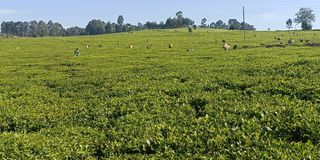Counties form teams to resolve stalemate over machine tea plucking

A tea plantation in Nandi County.
What you need to know:
- Nandi becomes the second county after Kericho to gazette the names of team members, with Bomet expected to follow suit
- The task forces will also look into land rates and lease terms for the companies
- Nyamira, which also hosts multinational tea companies, is affected by mechanisation but it has not formed a task force
Operations at multinationals in tea-growing regions are set for public scrutiny after two counties named teams to address the politics around deploying tea-plucking machines.
The task forces will also look into land rates and lease terms for the companies.
Nandi becomes the second county after Kericho to gazette the names of team members, with Bomet expected to follow suit.
Governor Stephen Sang appointed an 11-member taskforce to look into the tea leases to multinationals and other issues in the tea sector in a bid to resolve the impasse.
In a Gazette notice, the governor said taskforce members have been appointed to conduct an extensive review of multinational companies’ engagements in the tea subsector in Nandi and in collaboration with the county governments of Kericho and Bomet for a period of 90 days with effect from October 31, 2022.
Nyamira, which also hosts multinational tea companies, is affected by mechanisation but it has not formed a task force.
Governor Sang has appointed Mr John Cheruiyot, a former minister for cooperatives in the Daniel Arap Moi government to chair the team whose members include Nandi agriculture executive Dr Kiplimo Lagat, Rev Elijah Yego, Lands Executive Dr Philemon Bureti, Dr Ruth Choge, Nathan Tororei, acting executive finance Alfred Lagat, Steven Rotich and Wilson Lelmegit.
Godfrey Sang, Kibet Awi and Maureen Chepngetich will serve as members of secretariat of the taskforce.
Emerging challenges
The team will review current and emerging challenges facing multinationals in the tea sub-sector and other stakeholders in Nandi and make appropriate recommendations.
Leaders in the tea growing regions led by governors Sang (Nandi) and Erick Mutai (Kericho), have been pushing for suspension of tea-plucking machines so as to protect jobs.
In the recent past, the leaders have announced plans to hike land rates from Sh100 to Sh10,000 per acre annually and carry out a fresh land survey to establish the current acreage under the cash crop.
The teams will consider the role, effectiveness and relevance of multinational tea companies in managing the tea CESS and propose appropriate legal, policy and institutional frameworks to collect and channel it for use in a manner that benefits locals.
Mr Sang, his Kericho counterpart Mr Mutai and Governor Hillary Barchok of Bomet want the tea companies to scale down their mechanisation.
"If the operations and especially mechanisation, land lease, land rates and employment opportunities do not favour the locals, then we should be able to speak to the laws governing the sector," Mr Sang said.
Lease review
Dr Mutai revealed that multinationals pay Sh254 per acre in lease fees against the market rates of Sh7,000 per year, with the counties proposing this to be raised to Sh5,000 annually.
"When we raise the issues that we find are very critical and define our relationship as a people with the multinationals, the management threatens to relocate operations to Rwanda. This is unacceptable blackmail," Dr Mutai said.
The Kericho task force will be chaired by retired Captain Richard Too.
Other members are Kenya National Union of Teachers (Knut) first vice-chairman Stanley Mutai and former Knut National Executive Council (NEC) member Emily Cherotich Kirui.
Mr Nicolas Kirui, a former CEO of the Kenya Tea Growers Association (KTGA), Ms Francisca Chepkoech Ngetich and Ms Beatrice Sigei are members.
Others are Ms Mary Bett Chelangat, Bishop Reuben Kipkirui Kemei, David Siele, Willy Yegon Chepkutto and Philip Langat.
Mr Mabwai Kipkirui Eliazer, Mr Samwel Kebenei and Ms Irene Cherotich are members of the secretariat.






